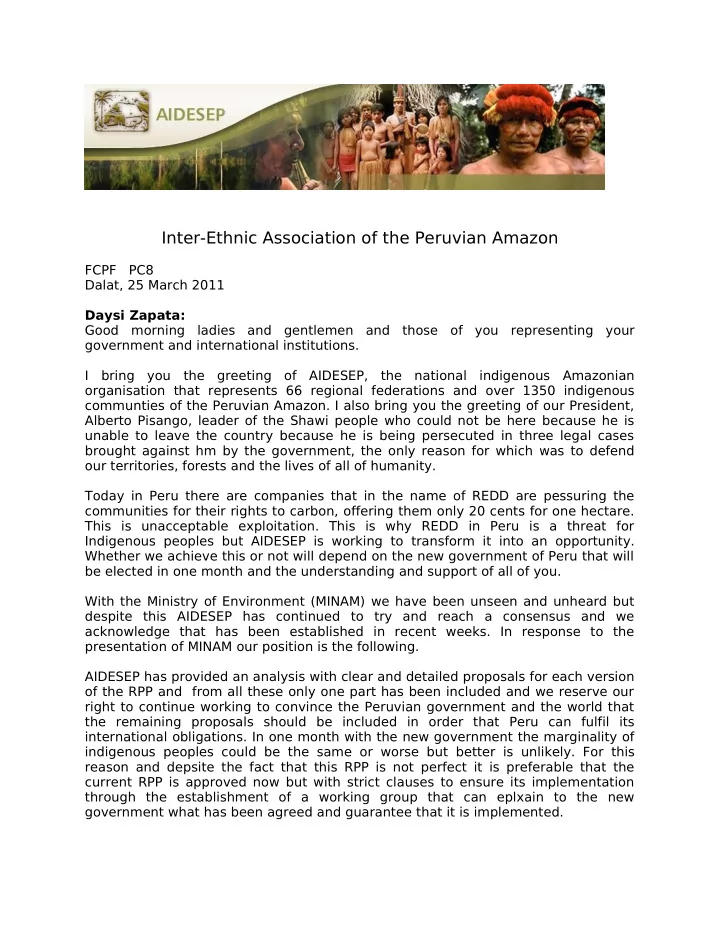

Inter-Ethnic Association of the Peruvian Amazon FCPF PC8 Dalat, 25 March 2011 Daysi Zapata: Good morning ladies and gentlemen and those of you representing your government and international institutions. I bring you the greeting of AIDESEP, the national indigenous Amazonian organisation that represents 66 regional federations and over 1350 indigenous communties of the Peruvian Amazon. I also bring you the greeting of our President, Alberto Pisango, leader of the Shawi people who could not be here because he is unable to leave the country because he is being persecuted in three legal cases brought against hm by the government, the only reason for which was to defend our territories, forests and the lives of all of humanity. Today in Peru there are companies that in the name of REDD are pessuring the communities for their rights to carbon, offering them only 20 cents for one hectare. This is unacceptable exploitation. This is why REDD in Peru is a threat for Indigenous peoples but AIDESEP is working to transform it into an opportunity. Whether we achieve this or not will depend on the new government of Peru that will be elected in one month and the understanding and support of all of you. With the Ministry of Environment (MINAM) we have been unseen and unheard but despite this AIDESEP has continued to try and reach a consensus and we acknowledge that has been established in recent weeks. In response to the presentation of MINAM our position is the following. AIDESEP has provided an analysis with clear and detailed proposals for each version of the RPP and from all these only one part has been included and we reserve our right to continue working to convince the Peruvian government and the world that the remaining proposals should be included in order that Peru can fulfil its international obligations. In one month with the new government the marginality of indigenous peoples could be the same or worse but better is unlikely. For this reason and depsite the fact that this RPP is not perfect it is preferable that the current RPP is approved now but with strict clauses to ensure its implementation through the establishment of a working group that can eplxain to the new government what has been agreed and guarantee that it is implemented.
Now I will hand over to Roberto Espinoza, member of the techinal team of AIDESEP to summarise those points that we consider to be non negotiable for any REDD strategy whether or not they are in the RPP: 1. The collective territorial rights of indigenous peoples : Laws that are over 40 years old that have divided our territory into small parcels called ‘communities’ and this should now be aligned with international legislation such as the Conevntion 169 of the ILO, teh sentences of the Inter-Americna Court of Human rights and the United Nations declaration on the rights of indigenous peoples. That oblige the State to recoognise our collective terrirtories as peoples. The RPP refers to this but indirectly and we will be vigilant that this is fulfilled becausde this is fundamental for us. Now we can see the maps that Peru must meet its outstanding commitment to title over20 million hectares of oustanding indigenous land claims. 2. Funds for land titling and demarcation. In order to title these 20 million hecatres approximately 20 million are required and now the RPP will contribute $1 million towards this of whihc only $200,000 will be derived from the FCPF. Thus, 95% of these funds remain pending and AIDESP proposes that the government commits to prioritize this territorial recognition throuhg some of the many REDD funds that it is receiving beginning with those from the FIP (who have accepted this) and from IDB funds amongst others and that this does not remian just one more promise. 3. Rights to ensure that REDD does not result in exploitation. The RPP says that there must be a national law for consultation and this is a start but we will continue to pressure that the text of this law should be that which was approved by the Congress on the 19.5.2010 and that it should not be altered due to the illegal pressures of the current President who will be leaving his office in just a few months. 4. A democratic REDD: In this sense the state should not only support conventional models of REDD but should respect indigenous REDD initiatives whose criteria and principles are recognised in the current RPP but again we must ensyre that this does not juts remain on paper and recieives th democratic support of the state. 5. Control the REDD bubble : The RPP only refers to this issue in a general fashion y this is a start but AIDESEP will pressure strongly for measures to detain the avalanche of companies and some NGOs that are deceiving, dividing and taking advantage of communities wiht millions of dollars that they do not have. To end with we ask the assembly the following : 1. The Peru RPP should be approved but with inclusions that should be incorpoarted in the final resolution which would include guarantees that these are recognised by the new government and we do not take any steps backwards in terms of our rights. 2. The participation of AIDESEP in the contact group to draft this resolution.
3. To establish a 4 part commission; FCPF, AIDESEP, MINAM and the iDB that will begin working from today and during the transfer between governments and will be responsible for guaranteeing the consensus that has been reached and the rights of all indigenous peoples.
Recommend
More recommend